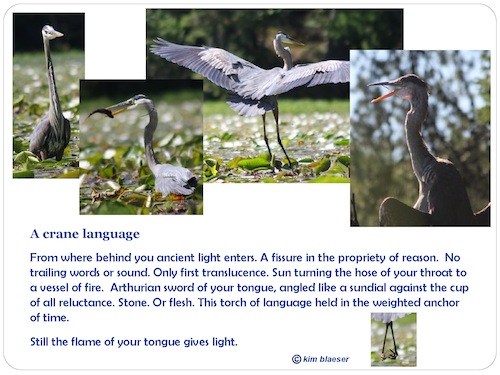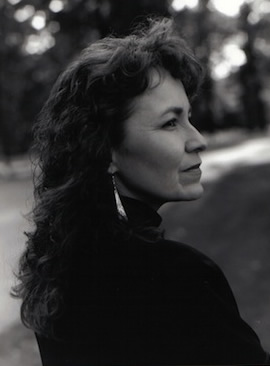Six Poems
A crane language

After Words
i.
Somewhere the talk of death
is exact,
a simple exchange:
Bullet for body.
Disease = death.
Sometimes the options
multiply
in rock-paper-scissors contests:
Early detection covers cancer.
Or in quid pro quo logic:
Take one breast for promise
to attend son’s wedding.
The math of afterlife
similarly has many formulas.
Dead = Dead.
Body gone, soul survives.
Heaven or hell.
Haunting.
Reincarnation.
Ceremonial after words—
Eternal rest grant unto them.
Meet the cacophony of ritual:
funerary, pallbearer, shroud.
And absence is given new form:
Urns. Mausoleums. Sky Burials.
May the road rise up to meet you.
Incense. Mourner’s Kaddish. Columbaria.
Dust to dust.
ii.
Where Sufi whirling
spins into Irish bagpipes
into the organ’s Old Rugged Cross
into the grey fog of human longing:
The after and before.
Now and nothingness.
This world, the next.
A father’s wrinkled hand turning cold.
The moment she turns the key to a quiet house.
A room made only of food and flowers.
A dog pacing at the window.
No keening or solemn song
lifts the steering column from a chest
keeps age at endless afternoon tea.
But it is a language of afterwards
a slow walk to a fresh swell of dark soil.
Because one year I was a mother
of toddlers, we talked of dog heaven
on the cabin bed while we searched
the wood-planked ceiling for pictures
in knots and lines. No less real
were the balloons and fishing poles
we found, no less real than the frog graves
and hamster graves and sweet sad
puppy dog graves we dug.
What I mean is hold on.
Flood the cracked walkway
of the drive-by shooting victim
with flowers of every denomination.
This year stop your fuel efficient car
at the Wisconsin’s earthen effigy mounds.
What I mean is spend wisely.
Ink your unique fingerprint;
then touch that known flesh
to anonymous marble names
on the Vietnam War memorial.
What I mean is another verse
of that song you hum while driving.
What I mean is less than this paper,
less than these words that I write.
iii.
Because the smallness of our being
is our only greatness.
Because one night I was in a room
listening until only one heart beat.
Because in these last years I’ve
worn and worn and nearly worn out
my black funeral shoes.
Because the gesture of after words
means the same thing no matter
who speaks them.
Because faith belief forever
are only words, no matter.
Because matter disappears
always and eventually.
Because action is not matter
but energy
that spent, changes being.
And if death, too, is a change of being
perhaps action counts.
And if death is a land of unknowing,
perhaps we do well to live with uncertainty.
And if death is a forested land,
it would be good to learn trees.
And if death is a kingdom,
it would be good to practice service.
And if death is a foreign state
we should loosen allegiance to this one.
And if the soul leaves our body
then we must rehearse goodbye.
On Climbing PetroglyphsI.
Newly twelve with size seven feet
dangling beside mine off the rock
ledge, legerdemain of self knowledge.
How do I say anything—magic
words you might need to hear?
With flute-playing, green-painted nails
your child’s fingers reach to span the range
of carmel-colored women in our past.
Innocently you hold those ghost hands:
each story a truce we’ve made with loss.
How can I tell you there were others?Big-boned women who might try
to push out hips in your runner’s body.
Women who will betray you for men,
a bottle, or because they love you
love you, don’t want to see you disappointed
in life, so will hold you, hold you hostage
with words, words tangled around courage
duty or money. When should I show you
my own flesh cut and scarred on the barbs
of belonging and love’s oldest language?II.
No, let us dangle here yet, dawdle
for an amber moment while notes shimmer
sweetly captured in turquoise flute songs—
the score of a past we mark together.
No words whispered yet beyond these painted
untainted rock images of ancients: sun, bird, hunter.
Spirit lines that copper us to an infinity.
Endurance. Your dangling. Mine.
Before the floor of our becoming.
Perhaps even poets must learn silence,
that innocence, that space before speaking.
Dreams of Water Bodies
Muskrat—Wazhashk,
small whiskered swimmer,
you, a fluid arrow crossing waterways
with the simple determination
of one who has dived
purple deep into mythic quest.
Belittled or despised
as water rat on land;
hero of our Anishinaabeg people
in animal tales, creation stories
whose tellers open slowly,
magically like within a dream,
your tiny clenched fist
so all water tribes might believe.
See the small grains of sand—
Ah, only those poor few—
but they become our turtle island
this good and well-dreamed land
where we stand in this moment
on the edge of so many bodies of water
and watch Wazhashk, our brother,
slip through pools and streams and lakes
this marshland earth hallowed by
the memory
the telling
the hope
the dive
of sleek-whiskered-swimmers
who mark a dark path.
And sometimes in our water dreams
we pitiful land-dwellers
in longing
recall, and singing
make spirits ready
to follow:
bakobii.*
*Go down into the water.
Copper crane bodies
Copper crane bodies
ride impossible stilt legs
through fields of June.
Angles of Being
It’s all angle after all.
What we see
and miss.
The leaf bird
limed and shadowed
to match
every other
green upturned hand
blooming on the August tree
Indecipherable
even when wings flutter
like leaves in breeze.
Or the silhouette
dark and curved
on the bare oak.
Beak,
parted tail,
each mistakable
for knot
branch
or twig.
Only if they exit the scene
unblend
isolate themselves
against too blue sky
does the game
of hidden pictures
end.
Ah, angles.
Tell all
or tell it slant.
What we
dream
appear
or inverted
seem to be.
—Kimberly Blaeser


